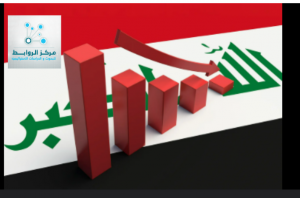Corruption, Mismanagement, Unemployment, and Poverty in Iraq: A Comprehensive Economic Analysis and a Path to Solution
Corruption, Mismanagement, Unemployment, and Poverty in Iraq: A Comprehensive Economic Analysis and a Path to Solution
4-16-2025
 Researcher Shaza Khalil*
Researcher Shaza Khalil*
More than two decades after the US invasion in 2003, Iraq continues to face a series of interconnected structural challenges that hinder its economic and social development. These challenges include widespread financial and administrative corruption, chronic mismanagement, high unemployment rates, and increasing poverty rates. Despite Iraq’s vast natural resources, particularly oil, transforming these resources into sustainable growth and social welfare remains elusive.
This analysis aims to shed light on the roots and intersectionality of these crises from a holistic economic perspective. It also proposes a set of policies and reforms to address structural weaknesses and achieve long-term stability and development.
First: Financial and Administrative Corruption – A Threat to the State
Corruption in Iraq is not merely an occasional phenomenon; it is a systemic crisis that pervades public administration and economic policies. It is estimated that hundreds of billions of dollars have been squandered due to corruption over the past two decades, placing Iraq at the top of the global corruption rankings, according to Transparency International’s Corruption Perceptions Index.
This rampant corruption has drained the state treasury and crippled the government’s ability to finance essential public services. Vital sectors, including health, education, infrastructure, and industry, have been harmed by corruption, sham deals, and ghost employees. Corrupt networks, often linked to political parties and militias, control state institutions, undermining the rule of law and hindering effective oversight.
Second: Mismanagement and the fragility of the oil-based rentier economy.
The Iraqi economy remains almost entirely dependent on oil, which accounts for more than 95% of state revenues. This rentier model makes Iraq vulnerable to fluctuations in global oil prices, leading to periods of financial abundance followed by severe economic crises. For example, the collapse in oil prices in 2020 led to an 11% contraction in GDP, while the economy experienced a temporary recovery in 2022 thanks to a 9.3% increase in prices.
This overreliance on oil hinders medium- and long-term economic planning and prevents the building of a stable economic environment. Successive governments have failed to diversify sources of income by developing productive sectors such as agriculture, industry, and technology.
Managing oil revenues is further complicated by international agreements after 2003. Under US Presidential Executive Order 13303, Iraqi oil revenues are deposited in a special account at the US Federal Reserve known as “Iraq-2,” pursuant to a 2015 US Presidential Resolution 13303, purportedly to protect Iraq’s assets from international lawsuits. Despite the legal protections this mechanism provides, many Iraqis view it as an infringement of national sovereignty. A recent agreement has been reached to gradually end the currency sales window and transition to direct transfers, which could pave the way for Iraq to regain its financial sovereignty.
Third: Unemployment and Poverty – A Social Time Bomb
The social impacts of corruption and mismanagement are having a serious impact on Iraqi society. The unemployment rate reached 16.5% at the beginning of 2024, while the poverty rate reached approximately 22%, with more than 10 million Iraqis living below the poverty line.
This crisis is exacerbated by the effects of war and displacement, with an estimated 6 million orphans and 2 million widows, in addition to more than 4 million people living in slums and marginalized areas, lacking basic services such as clean water, healthcare, and education.
The Iraqi labor market relies largely on employment in the public sector, which is bloated, unproductive, and plagued by waste and corruption. The private sector, meanwhile, is weak and limited due to poor infrastructure, administrative corruption, and difficulty accessing financing. Young people entering the labor market face an uncertain future, increasing the likelihood of migration, protests, and extremism.
Fourth: Recommendations – Towards a Resilient and Inclusive Economy
To address these intertwined crises, Iraq must adopt a comprehensive national reform plan that focuses on diversifying the economy and rebuilding institutions.
1. Combating Corruption:
Establishing an independent anti-corruption commission with judicial authority.
Digitizing government services and public procurement to enhance transparency. Enforcing mandatory financial disclosure and auditing for officials.
2. Diversify the economy
by investing in agriculture and food industries to create jobs and reduce imports. Support small and medium-sized enterprises through targeted financing programs.
Developing strategic industries such as renewable energy, technology, and construction.
3. Reform the labor market
by updating vocational and technical education programs to meet market needs. Support public-private partnerships to provide job opportunities for youth.
Launching temporary employment programs in infrastructure and housing.
4. Social Protection:
Expanding conditional cash assistance programs for the poorest families. Providing housing support and basic services to marginalized areas.
Supporting social and psychological rehabilitation programmes for orphans, widows and displaced persons.
5. Reform fiscal and monetary policies,
restructure the general budget to focus on capital investment rather than operating expenditures, and enhance the independence and efficiency of the Central Bank of Iraq.
Reviewing the legal framework for managing oil revenues to enhance Iraq’s economic sovereignty.
In conclusion, Iraq today stands at a historic crossroads. Despite the enormous challenges related to corruption, unemployment, poverty, and mismanagement, overcoming them is not impossible. With genuine political will, comprehensive institutional reforms, and a comprehensive and just economic vision, Iraq can turn a new page toward stability and prosperity.
The path to recovery requires not only financial resources; it also requires courageous leadership, popular participation, and a firm belief in justice and fairness. Only then can Iraq regain its status as an independent, prosperous, and fully sovereign state.
rawabetcenter.com
